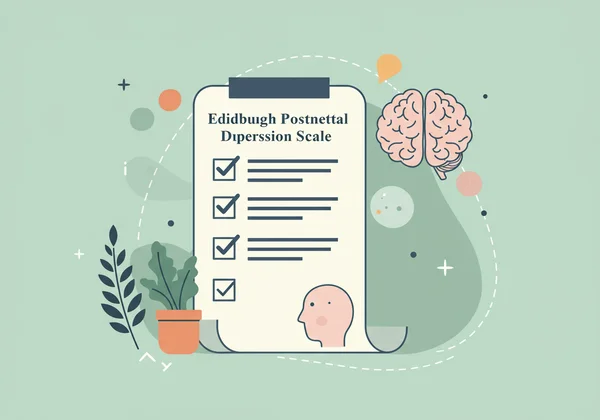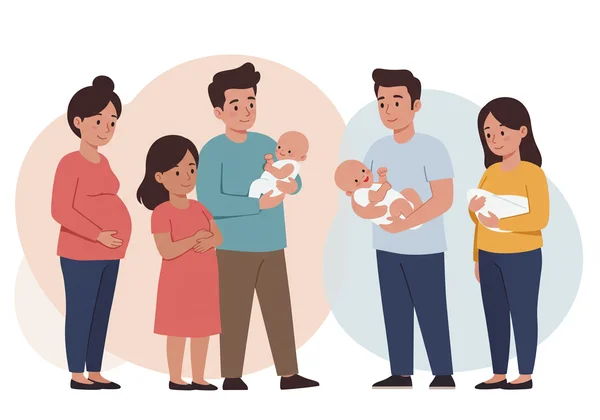Полное руководство по EPDS: Эдинбургская шкала послеродовой депрессии
November 11, 2025 | By Clara Maxwell
Путешествие беременности и нового родительства — это глубокий опыт, наполненный моментами невероятной радости и значительных перемен. Однако оно также может принести неожиданные эмоциональные проблемы. Если вы чувствуете себя подавленным, встревоженным или испытываете постоянное уныние, важно знать, что вы не одиноки, и существуют инструменты, которые помогут вам понять, что вы переживаете. Одной из наиболее надежных отправных точек является EPDS. Но что такое EPDS и как она может помочь?
Это руководство проведет вас через все, что вам нужно знать об Эдинбургской шкале послеродовой депрессии. Мы рассмотрим ее назначение, как работает система подсчета баллов и что могут означать ваши результаты. Ваше психическое благополучие является приоритетом, и понимание этого инструмента — первый шаг к тому, чтобы взять свое здоровье под контроль. Вы можете начать этот путь самосознания, пройдя конфиденциальный скрининговый тест уже сегодня.
Что такое Эдинбургская шкала послеродовой депрессии (EPDS)?
Эдинбургская шкала послеродовой депрессии (EPDS) — это простой, но мощный набор из 10 вопросов, разработанный для того, чтобы помочь новым и будущим родителям выявить потенциальные симптомы перинатальной депрессии. Это не диагностический инструмент, а высокоэффективный скринер, который помогает определить, когда может потребоваться консультация со специалистом здравоохранения. Думайте об этом как о решающем первом шаге в оценке вашего эмоционального состояния в течение преобразующего периода жизни.

Происхождение и назначение шкалы EPDS
Разработанная в 1987 году исследователями Коксом, Холденом и Саговски, шкала EPDS была создана для устранения критического пробела в послеродовой помощи. Они осознали, что многие родители страдали молча, часто принимая симптомы депрессии за обычный стресс нового родителя. Цель шкалы — быстро и эффективно отличить "бэби-блюз" от более стойких депрессивных симптомов, поощряя раннее вмешательство. Ее клиническая валидация сделала ее мировым стандартом, используемым врачами, акушерками и специалистами патронажной службы.
Почему ранний скрининг EPDS жизненно важен для молодых родителей
Раннее выявление является ключом к управлению перинатальным психическим здоровьем. Нелеченая депрессия может повлиять на вашу способность наладить эмоциональную связь с ребенком, ухудшить отношения и уменьшить радость родительства. Ранний скрининг с использованием EPDS дает вам возможность предпринять проактивные шаги. Он обеспечивает четкую, объективную отправную точку для обсуждения с вашим врачом, что приводит к более быстрой поддержке, лечению и выздоровлению. Это помогает обеспечить вам и вашему ребенку максимально здоровое и счастливое начало.
Кому следует рассмотреть возможность прохождения оценки EPDS?
EPDS ценна для широкого круга лиц. Хотя она в первую очередь предназначена для матерей в послеродовой период, ее использование расширилось, поскольку эмоциональные проблемы могут возникнуть в любое время. Вам следует рассмотреть возможность прохождения оценки, если вы:
- Родитель в послеродовой период, как правило, в течение первого года после родов.
- Беременный человек, так как депрессия и тревога могут начаться во время беременности.
- Партнер или супруг, обеспокоенный благополучием своей второй половины.
- Приемный родитель, приспосабливающийся к новой семейной динамике.
По сути, любой, кто участвует в перинатальном путешествии и испытывает постоянные чувства грусти, тревоги или трудности с совладанием, должен рассматривать это как полезный инструмент для послеродовой поддержки.

Прохождение EPDS: Понимание опросника и онлайн-теста
Сила онлайн-теста EPDS заключается в его простоте и доступности. Он разработан как краткая, личная самооценка ваших чувств за последние семь дней. Понимание того, как подходить к опроснику, гарантирует получение наиболее точных и полезных результатов, направляя вас на правильный путь к вашему психическому здоровью.
Более пристальный взгляд на 10 вопросов EPDS
Опросник состоит из 10 простых вопросов для самооценки. Эти пункты исследуют различные аспекты вашего эмоционального состояния без использования запутанного медицинского жаргона. Они касаются вашей способности испытывать удовольствие, чувств тревоги, самообвинения, режима сна и грусти. Один из важнейших вопросов также позволяет осторожно выявить мысли о самоповреждении, что позволяет быстро идентифицировать тех, кто нуждается в немедленной помощи. Основное внимание всегда уделяется тому, что вы чувствовали за последнюю неделю.
Обеспечение точных ответов для надежных результатов EPDS
Для достижения надежных результатов честность имеет первостепенное значение. Нет правильных или неправильных ответов, есть только ваши искренние чувства. Когда вы проходите тест, найдите тихое время для себя. Внимательно прочитайте каждый вопрос и выберите ответ, который наиболее точно отражает ваше самочувствие. Старайтесь не передумывать; ваша первоначальная интуитивная реакция часто является наиболее точной. Эта честная саморефлексия является мощным актом самопомощи.
Удобство и конфиденциальность нашего бесплатного онлайн-скрининга
В современном цифровом мире поддержка должна быть немедленной и конфиденциальной. Наша платформа предоставляет полностью бесплатный и конфиденциальный скрининг. Нет необходимости регистрироваться или предоставлять личные данные. Платформа поддерживает более 16 языков, что делает ее доступной для глобальной аудитории. Всего за несколько минут вы можете заполнить анкету, не выходя из дома, и мгновенно получить свой балл. Начните свой бесплатный скрининг EPDS сейчас, чтобы получить ценную информацию.

Подсчет баллов EPDS и интерпретация ваших результатов
После заполнения анкеты вы получите свой балл. Это число является отражением вашего текущего эмоционального состояния, но понимание системы подсчета баллов EPDS крайне важно для избежания неправильной интерпретации. Помните, что балл — это руководство, а не диагноз. Это данные, которые помогут вам и вашему врачу принять решение о дальнейших шагах.
Как рассчитывается ваш балл EPDS
Система подсчета баллов проста. Каждый из 10 вопросов имеет четыре возможных ответа, которые оцениваются от 0 до 3. Более высокий балл означает более выраженное присутствие конкретного симптома. Ваш общий балл EPDS — это сумма баллов по всем 10 вопросам, с максимальным возможным баллом 30. Этот простой расчет обеспечивает четкое и стандартизированное измерение потенциальных депрессивных симптомов.
Что означает диапазон ваших баллов EPDS для вашего психического здоровья
Интерпретация баллов помогает контекстуализировать ваши результаты, но для полной интерпретации крайне важно обсудить балл с профессионалом. В целом, баллы понимаются следующим образом:
- Балл 0-9: Указывает на низкую вероятность депрессии. Однако, если вы все еще чувствуете себя плохо, вам следует поговорить со своим врачом.
- Балл 10-12: Указывает на возможный риск депрессии. Желательно следить за своими симптомами и запланировать беседу со специалистом здравоохранения.
- Балл 13+: Указывает на высокую вероятность депрессии. Настоятельно рекомендуется как можно скорее обратиться за профессиональной консультацией.
Любой балл выше нуля по вопросу 10 (относительно самоповреждения) требует немедленного профессионального наблюдения.
Скринирует ли EPDS также тревожность? Понимание ее области применения
Это распространенный и важный вопрос. Хотя EPDS в первую очередь является скринером депрессии, несколько ее вопросов затрагивают общие симптомы тревожности, такие как чувство беспричинного страха или паники. Высокий балл часто может указывать на наличие как депрессии, так и тревожности, поскольку они часто сосуществуют. Однако EPDS не является специализированным инструментом для скрининга тревожности. Если тревожность является вашей основной проблемой, ваш врач может порекомендовать более конкретную оценку.
После получения результатов EPDS: Что делать дальше и где найти поддержку
Получение вашего балла EPDS — это начало, а не конец вашего пути. Независимо от того, низкий или высокий ваш балл, он предоставляет ценную информацию. Следующий шаг — использовать эту информацию для построения плана поддержки и благополучия. Ваш результат — это сигнал к действию, и существует множество ресурсов, которые помогут вам принять решение о дальнейших действиях после получения высокого балла EPDS.

Когда и как обсудить ваш балл EPDS со специалистом
Обсуждение вашего балла EPDS с врачом, акушеркой или терапевтом является самым важным следующим шагом. Запишитесь на прием и возьмите с собой свой балл. Откровенно расскажите о своих ощущениях. Этот балл дает им стандартизированную отправную точку для более глубокой беседы. Помните, что обращение за профессиональной медицинской помощью — это признак силы и лучший способ получить точный диагноз и эффективный план лечения.
Навигация по вашему пути к перинатальному психическому благополучию
Помимо профессиональной помощи, ваш путь к психическому благополучию может быть поддержан созданием сильной сети. Поговорите со своим партнером, доверенным другом или членом семьи. Присоединитесь к местной или онлайн-группе поддержки для молодых родителей. Уделяйте приоритетное внимание небольшим актам самопомощи, таким как короткие прогулки, обеспечение отдыха по возможности и употребление питательной пищи. Каждый маленький шаг способствует вашему общему благополучию.
Ценность нашего отчета с глубоким анализом на основе ИИ
Для тех, кто ищет более глубокого понимания, наша платформа предлагает уникальную функцию: необязательный отчет с анализом на основе ИИ. Он выходит за рамки одного числа вашего балла. Предоставляя немного больше анонимного контекста, вы можете разблокировать персонализированный отчет, который определяет ваши уникальные сильные стороны, потенциальные проблемы и практические рекомендации, адаптированные к вашей ситуации. Этот инновационный инструмент может помочь вам лучше понять нюансы ваших чувств. Получите свой балл и изучите эту расширенную опцию.
Взять под контроль свое перинатальное психическое здоровье
Понимание и использование Эдинбургской шкалы послеродовой депрессии — это мощный акт заботы о себе. Она обеспечивает ясность в период, который может показаться запутанным и подавляющим. Уделив несколько минут конфиденциальному скринингу, вы ставите во главу угла свое здоровье и благополучие своей семьи. Этот простой шаг может открыть дверь к разговорам, поддержке и ресурсам, которые помогут вам уверенно и радостно справляться с родительством.
Не откладывайте заботу о себе. Ваше эмоциональное здоровье так же важно, как и физическое. Сделайте первый шаг сегодня. Посетите Epds.me, чтобы пройти бесплатный, конфиденциальный скрининг EPDS и расширить свои знания.
Часто задаваемые вопросы об EPDS
Что такое EPDS?
EPDS (Эдинбургская шкала послеродовой депрессии) — это самооценочный опросник из 10 вопросов, используемый во всем мире для скрининга симптомов депрессии во время беременности и после родов. Это инструмент, помогающий выявить людей, которым может потребоваться дальнейшая оценка специалистом здравоохранения.
Какой балл EPDS считается нормальным?
«Нормального» балла не существует, поскольку опыт у каждого свой. Однако балл от 0 до 9 обычно относится к диапазону низкого риска, что указывает на низкую вероятность клинической депрессии. Тем не менее, важно обратиться за помощью, если вы чувствуете, что что-то не так, независимо от вашего балла.
Как интерпретируется балл EPDS?
Балл EPDS интерпретируется в диапазонах. Балл 10-12 указывает на возможный риск депрессии, в то время как балл 13 или выше указывает на высокую вероятность. Самое главное, любой балл выше нуля по последнему вопросу о самоповреждении требует немедленного обращения за профессиональной помощью. Балл является отправной точкой для беседы со специалистом здравоохранения.
Скринирует ли EPDS тревожность?
Хотя ее основное внимание уделяется депрессии, EPDS может косвенно свидетельствовать о наличии тревожности, поскольку несколько вопросов касаются таких чувств, как паника и беспокойство. Высокие баллы часто коррелируют с симптомами тревожности, но это не специфический диагностический инструмент для тревожных расстройств. Если тревожность является вашей основной проблемой, ваш врач может порекомендовать более конкретную оценку.
Бесплатен ли тест EPDS?
Да, тест EPDS полностью бесплатен на многих платформах. Вы можете получить доступ к нашему бесплатному инструменту без каких-либо затрат или требований к регистрации, что гарантирует каждому доступ к этому важному инструменту скрининга психического здоровья.